17 Oct 2019 | News and features, Student Reading Lists
[vc_row][vc_column][vc_column_text]Index on Censorship was established in 1972 in a febrile period: Idi Amin had taken power in Uganda, the Vietnam war continued, direct rule was imposed in Northern Ireland, there was a coup in Bolivia and Congo was renamed Zaire by its dictator president. As writer Robert McCrum said in our 40th anniversary issue: “The abuses of freedom worldwide in the 1970s were so appalling and so widespread that the magazine rapidly found itself in the frontline of campaigns. Index became a clarion voice in the cause of free expression.” The right to protest and freedom of expression are now being sought in Hong Kong and elsewhere, and Index is still to the forefront in reporting abuses. Here are just some of the conflicts between freedom and dictatorship we have reported on in the past 47 years.
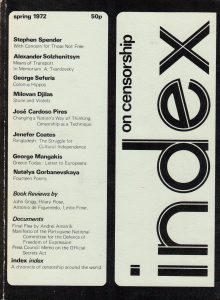
The first issue of Index on Censorship magazine, in March 1972
The Clockwork Show vol 1, issue 1, March 1972
In an anonymous article about life in Greece under the regime of the Colonels’ junta, the writer considered the psychology of the situation; the feelings and attitudes, the long-ranging impact of this harrowing experience. “There is nothing more demoralizing than to be bound to a public body, an administration, a government with which one can never for a moment identify, which is the exact opposite of everything one believes in. One cannot live side by side with Philistinism, chauvinism, bigotry, blatant hypocrisy, crass ignorance, injustice, violence and brutality and not be affected by them, even if one manages—only just—to keep them out of one’s own life. Under this regime there is no relief; no exception: the regime has penetrated every single aspect of public life.”
Read the full article

March 1974: TV, politics and Chile Index on Censorship magazine
Book burning and brutality vol 3, issue 1, March 1974
A fascinating insight into life in Chile six months after a coup ended the tyranny of President Salvador Allende: worse was to come under a military dictatorship, reported Michael Sanders, an Englishman in Santiago. “When Allende left Chile to address the UN in December 1972, a leading opposition newspaper had as its front-page a photo depicting the president flushing himself down a lavatory, with the caption ‘ good riddance’. The contrast in December 1973 is gloomy indeed. Not so much, or not only because of the drab uniformity of censored newspapers that, for all they may be censored, willingly reflect the views of the Military Junta. But for the fact that 43.6% of the population have been deprived of all means of expression, of all normal communication, and live in daily fear of their lives and jobs.”
Read the full article

Russia, East Germany, South Africa: May 1979 Index on Censorship magazine
Black journalists under apartheid volume 8, issue 3, May 1979
William A Hachten reports: Black journalists came to the fore in the Soweto riots of 1976 when they reported from the ghetto for a white press without access. Yet black journalists still faced daily harassment under apartheid, which worsened with the death of Steve Biko in 1977. Vusi Radebe, a black stringer for the Rand Daily Mail, said: “The situation is worse since the 1976 riots. Police will beat up reporters on the slightest provocation for what they consider obstruction of justice.” While whites had 23 newspapers, there were none for non-whites to express their political frustration. Black journalist Pearl Luthuli said: “The black journalist can’t be objective. We try to tell it like it is but the white editors won’t print it.” Another said: “We are black people first, journalists second. If it comes to a conflict between the struggle and the job, the struggle comes first.”
Read the full article

Beckett and Havel: Index on Censorship magazine, February 1984
Iran under the party of God, volume 13, issue 1, February 1984
“Censorship was planned by the regime of the Islamic Republic even before the February 1979 revolution brought Ayatollah Khomeini’s theocratic oligarchy to power. This particular kind of censorship may not be without precedent in history, but it must certainly be rare. There were attacks on coffee-houses, restaurants and other public places by men armed with clubs and stones; unveiled women were harassed; slogans of the opposition were cleaned from the walls; banks, cinemas and theatres were burned” – a personal account of the first years of the revolution and its attack on culture, by one of Iran’s leading writers Gholam Hoseyn Sa’edi. “And it keeps on happening. The Islamic regime of today has gone a step beyond censoring the creations of science, culture and art, beyond censoring life itself: it has rendered life vain and all but unliveable.”
Read the full article
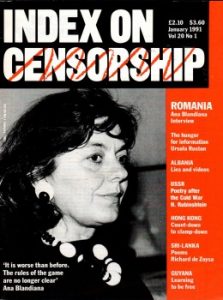
Romania, Albania, USSR: Index on Censorship magazine January 1991
A sense of solidarity, volume 20, issue 1, January 1991
Romania’s celebrated poet, Ana Blandiana, on censorship under Ceausescu and how she fought back. Her work was completely banned three times. “In my case, the form of censorship progressed from the banning of a word to that of a line, then of a poem, then of a book, to the total erasure of my signature as author: an eradication of identity. My inner freedom was assured by a decision I took in 1980, a personal one rather than as a writer. I decided to be outspoken and say what I thought at the risk of becoming a victim myself, rather than suspect a possibly honest person. At first it kept me sane, and then it helped me to be a normal writer, relatively free of self-censorship. This was the strongest form of censorship under Communism in the last 10 or 15 years, and was much more refined and subtle than the official censorship.”
Read the full article
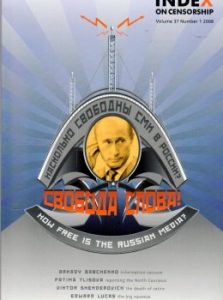
How free is the Russian media? Index on Censorship, Spring 2007
The Big Squeeze, volume 37, issue 1, Spring 2008
“The fact remains that since the departure of the oligarchs, Russian media freedom has gone from the imperfect and beleaguered to the moribund. At national television, which 90 per cent of Russians say is their main source of news, editors receive weekly or even daily instructions from the Kremlin on the ‘line to take’ on important stories; around half of Russian viewers think that what they watch is objective, a 2007 poll said. Foreign coverage is polemical and outrageously politicised. The message of all this is ‘be quiet’. If you annoy the rich and powerful you face threats, beatings or death. Even when the Kremlin is not directly involved, its reaction to the persecution of journalists sends a clear message: if you offend the powerful, don’t expect the law to protect you.” Edward Lucas gave an early taste of what freedom of expression meant under Putin.
Read the full article
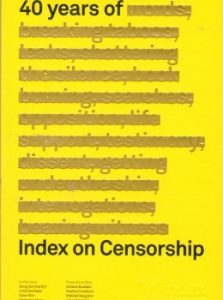
40 years of Index on Censorship March 2012
Grit in the engine, volume 41, issue 1, Spring 2012
Robert McCrum on the 40th anniversary of Index on Censorship. “The success of Index was not a foregone conclusion. Stephen Spender, its founder, was fully alert to the potential for windbaggery and failure. There was, he wrote, ‘the risk that the magazine will become simply a bulletin of frustration’. Actually, the opposite came to pass. Index became a clarion voice in the cause of free expression. The abuses of freedom worldwide in the 1970s were so appalling and so widespread that the magazine rapidly found itself in the frontline of campaigns. Perhaps the most important thing Index did, from the beginning, was to universalise an issue in peril of becoming a special interest: freedom was not ‘a luxury enjoyed by bourgeois individualists’. Along with self-expression, it was a human right, and an instrument of human consciousness.
Read the full article
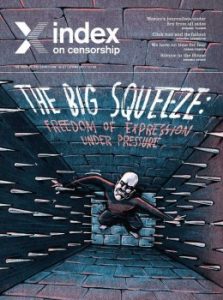
The big squeeze: Index on Censorship magazine Spring 2017
Freedom of expression under pressure, volume 46, issue 1, Spring 2017
The spring 2017 issue of Index on Censorship magazine looks at how pressures on free speech are currently coming from many different angles, not just one. Special features on how to spot fake news, articles from former BBC World Service director Richard Sambrook and former UK attorney general Dominic Grieve, an exclusive interview with the Spanish puppeteer arrested last year, and fiction from award-winning writer Karim Miské.
[/vc_column_text][/vc_column][/vc_row]
28 Sep 2019 | Russia, Russia Incident Reports
[vc_row][vc_column][vc_column_text]
Index on Censorship’s Monitoring and Advocating for Media Freedom project tracks press freedom violations in five countries: Azerbaijan, Belarus, Russia, Turkey and Ukraine. Learn more.
[/vc_column_text][vc_custom_heading text=”14 Incidents” use_theme_fonts=”yes”][/vc_column][/vc_row][vc_row][vc_column][vc_column_text]
Kostroma photographer detained and asked to admit to terrorism
28 September – Alexey Molotorenko, photographer with the regional media outlet 7×7, was detained by the National Guard of the Russian Federation (Rosgvardia), when he was taking photos outside the Rosgvardia building, 7×7 reported.
Molotorenko was approached by a several Rosgvardia officers, who demanded that he delete the photos. When he refused to do so, they reportedly grabbed him and took him into the headquarters, where they confiscated his phone and searched his bag.
Four officers, including one from anti-extremism section of the Ministry of Interior Affairs, questioned the reporter for four hours, demanding that he admit involvement in terrorist activities. According to Molotorenko, they threatened to “cause problems” for his family if he didn’t plead guilty. The journalist was taken to a local police department and subsequently released without charge. 7×7 called the incident unacceptable obstruction of journalistic activities and sent complaints to the police and Rosgvardia.
Links:
https://7×7-journal.ru/articles/2019/09/28/v-kostrome-fotokorrespondenta-7h7-alekseya-molotorenko-zaderzhali-za-semku-vorot-chasti-rosgvardii?fbclid=IwAR1vX3xFjnngwgWi708AxOehxzrV_KcvlPh_mkNBjZ8530HDEjgwxpKYQIM
Categories: Arrest/Detention/Interrogation, Intimidation
Source(s) of violation: Police/State security
Associated Press reporter threatened after interview with the head of the Central Election Committee
26 September – Natalia Vasilieva, a reporter with international news agency Associated Press, said she received threats from the Central Election Committee after interviewing its head Ella Pamfilova about the Moscow city parliament election that took place in August, which were met with mass protests against the disqualification of independent candidates, news agency Zakon reported.
After the interview was published at the end of August, the Central Election Committee accused Vasilieva of twisting Pamfilova’s words and called the article “propaganda”. According to Vasilieva, the deputy head of the Central Election Committee told her boss that Natalia would never have a career and would not be allowed back to Central Election Committee, Ministry of Foreign Affairs, or the Kremlin.
Links:
https://twitter.com/zakon_agency/status/1177143388354879488
https://ovdinfo.org/express-news/2019/09/26/korrespondent-associated-press-rasskazala-ob-ugrozah-ot-cik-posle-intervyu-s?utm_source=fb&utm_medium=share&fbclid=IwAR24ysh4BEtIc976NA5aoyg31I2tWed-nuUz8rBWnVcoLaDULIY5XVxUqkA
Categories: Intimidation
Source(s) of violation: Government/State Agency/Public official(s)/Political party
Head of Petrozavodsk prison threatened to sue Zona.Media over an article about the torture of detainees
26 September – Ivan Savelev, head of Petrozavodak jail №9, threatened to sue Zona.Media over a piece they published about detainees being tortured, Zona.Media reported.
The article, which was published on 24 September, contained interviews with former detainees about torture they endured at the hands of Ivan Savelev.
Savelev says that he plans to sue the website, the journalist, and the former detainees that were cited for defamation. Savelev says he sent a complaint to the Investigative Committee regarding damage to his professional reputation.
Links:
https://zona.media/news/2019/09/26/nine?fbclid=IwAR2e7u0UDUZcFUo3D5tOsaBQlUj1vfycdY_ShVaT9-3K60fr55roHQmlSvI
Categories: Intimidation
Source(s) of violation: Police/State security, Government/State Agency/Public official(s)/Political party
“Young Journalists of Altai region” fined for 20-year old hyperlink
25 September – Justice of the Peace of Zheleznodorozhny district court fined the Young Journalists of Altai Region 50,000 rubles ($778) for a 1999 hyperlink to the Open Society Foundation website, Zona.Media reported. George Soros’ OSF was deemed “an undesirable organization” by the Russian government in 2017.
“We forgot that we had it [the link] among the volume of information. But vigilant officials found it,” Sergey Kanarev the head of Young Journalists of Altai Region said.
Links:
https://zona.media/news/2019/09/25/srs1999?fbclid=IwAR17oT7kLDt0ttM69DMuqpDi9FJoJ0VxPrCnqPVEyfsIf29QZUpVrixm85c
https://www.facebook.com/skanarev/posts/10212743590503246
https://tayga.info/149030
Categories: Legal Measures
Source(s) of violation: Government/State Agency/Public official(s)/Political party
Izvestia newspaper removed article criticizing Defence Minister
24 September – A daily newspaper Izvestia, which belongs to the state-owned National Media Group, removed from its website the op-ed “The achievements of Sergey Shoigu as Defense Minister” by the military reporter Ilya Kramnik, who described the incident in a Facebook post.
Referring to an interview by the newspaper Moskovsky Komsomolets with the Defence Minister Sergey Shoigu, Kramnik wrote that it’s unlikely to be correct that the recovery of the Russian army was due to the appointment of Shoigu, since its reform was initiated by the previous minister. Kramnik also wrote that the defence ministry has taken more of a propagandist line since Shoigu’s appointment.
Kramnik reportedly said that he didn’t know the specific reasons behind the removal of the article but that some kind of administrative pressure was involved. The newspaper’s press service allegedly accused Kramnik of violating corporate standards and said that the article was deleted because it didn’t align with editorial standards. The newspaper said that the decision was made by the editorial board, which considered the material to be insufficiently developed with too many of Kramnik’s views rather than facts. Kramnik said that he didn’t receive any comments about the article until it was published. Kramnik is reportedly no longer working for the publication.
Links:
https://www.facebook.com/i.kramnik/posts/2371375439597846
https://www.svoboda.org/a/30183529.html
https://www.bbc.com/russian/news-49838990
Categories: Censorship
Source(s) of violation: Employer/Publisher/Colleague(s)
Pskov journalist Svetlana Prokopeva officially charged with justifying terrorism
20 September – Radio Svoboda reported that Svetlana Prokopeva, a Pskov-based independent journalist, was officially charged with justifying terrorism for discussing whether the planting of a bomb by a 17-year-old student at a Federal Security Service headquarters last year was provoked by a repressive political regime. The journalist pleads not guilty. Her lawyers called the charges absurd.
Links:
https://www.svoboda.org/a/30175507.html
https://ifex.org/russia-journalist-svetlana-prokopyeva-faces-seven-years-in-jail-on-justifying-terrorism-charge/
Categories: Criminal Charges/Fines/Sentences
Source(s) of violation: Police/State security, Court/Judicial
Local journalist detained ahead of president visit to Izhevsk
19 September – Dariya Komarova, a reporter from Idel Real was detained in Izhevsk ahead of President Putin’s visit to the city, Idel Real reported. Policemen detained the journalist while she was taking photos of residents passing through security check-point to get to the main square. Komarova was released shortly afterwards, but was told that the police would be watching and checking her.
Links:
https://www.idelreal.org/a/30173086.html
https://zona.media/news/2019/09/19/zaderzhali?fbclid=IwAR2u6lx_dXM5RcV4OVSxlgn0GiTm0LkcIBW2GpeaCTRtfBm5OTyQbCUb5zM
Categories: Arrest/Detention/Interrogation, Intimidation
Source(s) of violation: Police/State security
Senator accused Proekt.Media’s founder of graduating from “CIA school”
16 September – According to the media outlet Lenizdat, Andrey Klimov, the head of Federation Council’s Commission on Sovereignty Protection, accused the founder and editor-in-chief of investigative online outlet Proekt.Media, Roman Badanin, of studying in a “private intelligence school”, that prepares “anti-Russian journalists”. Klimov called Stanford University, where Badanin studied in 2017, a “CIA school”.
Links:
https://lenizdat.ru/articles/1156256/?fbclid=IwAR0_R7Ul8Wp22kMrPnAFdXWwuA_M3A-IbYsJ53dhIdkYBvddgEpceWLF9nc
Categories: Online Defamation/Discredit/Harassment/Verbal Abuse
Source(s) of violation: Government/State Agency/Public official(s)/Political party
Student media reporter detained in Moscow at rally in support of political prisoner
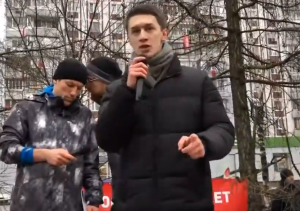
Prior to his arrest in August, Yegor Zhukov had urged people not to be cowed into silence. He had been participating in the protests.
14 September – Tatyana Kolobakina, reporter with the student media outlet DOXA, was detained in Moscow at a student rally in support of political prisoner and fellow student, Zona.Media reported. Kolobakina was detained alongside two rally participants, who were dressed in T-shirts with slogans “Freedom to Zhukov”. Kolobakina has a similar sticker on her bag. All the detainees were released briefly without any charges and were told that they had been mistakenly detained while police were checking “info about some organization”.
Links:
https://www.kommersant.ru/doc/4094194
https://ovdinfo.org/express-news/2019/09/14/na-parade-moskovskogo-studenchestva-zaderzhali-dvuh-studentov-i?utm_source=fb&utm_medium=share&fbclid=IwAR0Amm0Ai9DarRmc8-pqVgqvSrZ5FQVP-p40vlUsJhWU2HSY20GdbJ4RDuA
Categories: Arrest/Detention/Interrogation
Source(s) of violation: Police/State security
St-Petersburg journalist targeted by media outlets allegedly tied to “troll factory”
12 September – Mariya Karpenko, a former Fontanka reporter who was fired in March because of her personal Telegram-account on Saint Petersburg politics, became a target of several defamation articles, Lenizdat reported.
According to reports, the articles may be linked to Evgeny Prigozhin’s “media factory”, which publishes almost identical pro-government articles and targets independents journalists and opposition activists.
Links:
https://lenizdat.ru/articles/1156242/?fbclid=IwAR1N60ZuAzpTBNth5ynq_ctmCv1PL6K94RWCvfry99GJnqMYuqMkU1kZCU4
https://www.svoboda.org/a/29830046.html
https://primechaniya.ru/sankt-peterburg/novosti/avtora-rassledovaniya-o-finansirovanii-vybornoj-kampanii-beglova-nachali-travit-v-smi
Categories: Online Defamation/Discredit/Harassment/Verbal Abuse
Source(s) of violation: Another media
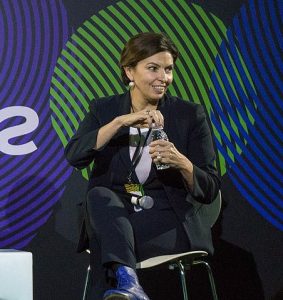
Dozhd CEO Natalia Sindeeva was summoned for questioning in September.
Dozhd CEO questioned over funding received during the July protests
10 September – CEO of independent broadcaster Dozhd, Natalia Sindeeva, was summoned for questioning related to funding Dozhd received during the July protests, Sindeeva said in Facebook post. During the protests in late July the broadcaster lifted the paywall and encouraged viewers to donate money.
Links:
https://www.newsru.com/russia/10sep2019/sind_dopros.html?utm_source=share&fbclid=IwAR1264qd3E9ksE4Prq3_7dw9fSRCP0hvF5UqMs9W8HEKngaX5LAF6BvXu_c
https://zona.media/news/2019/09/09/sindeeva?fbclid=IwAR2cA7MskqAUB5vuVXgWRKrtx6DA4FHmnLwY6hSVySzYm6EIpOXmVo10PEs
Categories: Arrest/Detention/Interrogation
Source(s) of violation: Police/State security
Bus with journalists attacked in Tuva
7 September – A bus with journalists and observers, that were going to monitor and report on the local elections, was attacked with a gun fire at the border of Krasnoyarsk region and Tuva republic, local deputy Sergey Natarov said in his Facebook.
Witnesses say the bus was attacked by a group of around 10 gunned men.
The police said that nobody was injured and said that only the front wheels of the bus were damaged.
Links:
https://www.facebook.com/photo.php?fbid=1369336403228476&set=a.405289099633216&type=3
https://www.svoboda.org/a/30152508.html?fbclid=IwAR0LyiXDB0NzNxtrvL1TZXlcaYqO1pToUXTSVOBbOwGkr9dUXY2RbZyfwt8
https://www.sibreal.org/a/30152426.html
https://t.me/pdmnews/20352
Categories: Intimidation
Source(s) of violation: Unknown
At least 3 journalists detained in Moscow before rally in support of political prisoners
8 September – Journalists Ilya Azar and Natalia Ivleva were detained in the centre of Moscow before the rally in support of political prisoners, MBH Media reported. Later MBH Media reported that journalist Maxim Kondratyev was also detained.
Links:
https://tvrain.ru/news/v_moskve_zaderzhali_zhurnalista_ilju_azara-493121/?fbclid=IwAR3kKIRLIm87drmSxftigXAff_sB0wrcuT6ap0tyoHuvRI6u3LCZOCr5frY
https://t.me/mbkhmedia/13378
https://www.mk.ru/politics/2019/09/08/v-moskve-zaderzhany-aktivisty-zhurnalisty-sredi-nikh-ilya-azar.html
Categories: Arrest/Detention/Interrogation
Source(s) of violation: Police/State security
Fly Auto sues Dozhd for 1 billion roubles
5 September – A car rental firm Fly Auto filed a 1 billion roubles ($15,300 millions) lawsuit against independent broadcaster Dozhd, Navalny said in his Twitter.
According to court documents, the lawsuit was registered on 5 September. Fly Auto accuse Dozhd of organising mass protest against the disqualification of independent candidates for local elections, that as the company claims, resulted in billion damage due to cancelled orders for car rentals, disrupted services and protesters damaging cars.
Update:
15 November – Arbitration court of Moscow dismissed the lawsuit against Dozhd TV channel, quoting lack of proof in the documents provided by the company.
Links:
https://zona.media/news/2019/09/05/flaj_avto?fbclid=IwAR1ye8yqjas57ArvgRe1uUhVF8XXX5Gd3voBuNOyfdRaV-empq0YV2VcZp0
https://www.novayagazeta.ru/news/2019/09/05/155024-kompaniya-po-prokatu-avtomobiley-podala-isk-k-fbk-i-dozhdyu-na-milliard-rubleyhttps://
www.kasparov.ru/material.php?id=5DCEA674AD5BE
Categories: Subpoena / Court Order/ Lawsuits
Source(s) of violation: Corporation/Company[/vc_column_text][/vc_column][/vc_row][vc_row][vc_column][vc_basic_grid post_type=”post” max_items=”4″ element_width=”6″ grid_id=”vc_gid:1574958188379-c9ec03b6-f725-9″ taxonomies=”8996″][/vc_column][/vc_row]
12 Sep 2019 | Magazine, Magazine Contents, Volume 48.03 Autumn 2019
[vc_row][vc_column][vc_custom_heading text=”With contributions from Kerry Hudson, Chen Xiwo, Elif Shafak, Meera Selva, Steven Borowiec, Brian Patten and Dean Atta”][/vc_column][/vc_row][vc_row][vc_column][vc_column_text]

Border forces – how barriers to free thought got tough
The autumn 2019 Index on Censorship magazine looks at how borders are getting tougher, journalists are being stopped, visas refused and border officials are snooping into our social media profiles and personal messages. Nations are looking to surveil our thoughts before allowing us to come into their countries and so limiting freedom of expression and the free flow of ideas.
In this issue Steven Borowiec reports from South Korea about how the law means that you can be prosecuted for contacting your relatives in the north without permission; Meera Selva looks at how internet shutdowns are being used round the world to prevent people communicating, most recently in Kashmir; Mark Frary gives tips for LGBT people on how to protect themselves when crossing borders into countries where they might face discrimination. Charlotte Bailey and Jan Fox look at how it is getting tougher in the UK and USA for artists, writers and academics to get visas; and Kaya Genç digs into Turkey’s censorship of the internet. In the rest of the magazine, writers Emilie Pine, Elif Shafak and Kerry Hudson, and theatre director Nicholas Hytner reflect on past famous Index contributors, Václav Havel, Nadine Gordimer, Samuel Beckett and Arthur Miller. We have an extract of the script of the 1977 film Le Camion by Marguerite Duras which has never appeared in English before, and poems by taboo-breaking poet Dean Atta and the Liverpool Poet Brian Patten. We also have an extract of a story by censored Chinese writer Chen Xiwo about a mother and her daughter and their abusive relationship. Plus Index magazine’s first ever crossword by Herbashe.
[/vc_column_text][/vc_column][/vc_row][vc_row][vc_column][vc_custom_heading text=”Special Report: Border forces: how barriers to free thought got tough”][/vc_column][/vc_row][vc_row][vc_column][vc_column_text]Big brother at the border by Rachael Jolley
Switch off, we’re landing! by Kaya Genç Be prepared that if you visit Turkey online access is restricted
Culture can “challenge” disinformation by Irene Caselli Migrants trying to cross the Mediterranean to Europe are often seen as statistics, but artists are trying to tell stories to change that
Lines of duty by Laura Silvia Battaglia It’s tough for journalists to visit Yemen, our reporter talks about how she does it
Locking the gates by Jan Fox Writers, artists, academics and musicians are self-censoring as they worry about getting visas to go to the USA
Reaching for the off switch by Meera Selva Internet shutdowns are growing as nations seek to control public access to information
Hiding your true self by Mark Frary LGBT people face particular discrimination at some international borders
They shall not pass by Stephen Woodman Journalists and activists crossing between Mexico and the USA are being systematically targeted, sometimes sent back by officials using people trafficking laws
“UK border policy damages credibility” by Charlotte Bailey Festival directors say the UK border policy is forcing artists to stop visiting
Ten tips for a safe crossing by Ela Stapley Our digital security expert gives advice on how to keep your information secure at borders
Export laws by Ryan Gallagher China is selling on surveillance technology to the rest of the world
At the world’s toughest border by Steven Borowiec South Koreans face prison for keeping in touch with their North Korean family
Stripsearch by Martin Rowson Bees and herbaceous borders
Inside the silent zone by Silvia Nortes Journalists are being stopped from reporting the disputed north African Western Sahara region
The great news wall of China by Karoline Kan China is spinning its version of the Hong Kong protests to control the news
Kenya: who is watching you? by Wana Udobang Kenyan journalist Catherine Gicheru is worried her country knows everything about her
Top ten states closing their doors to ideas by Mark Frary We look at countries which seek to stop ideas circulating[/vc_column_text][/vc_column][/vc_row][vc_row disable_element=”yes”][vc_column][vc_custom_heading text=”Global View”][vc_column_text]Small victories do count by Jodie Ginsberg The kind of individual support Index gives people living under oppressive regimes is a vital step towards wider change[/vc_column_text][/vc_column][/vc_row][vc_row][vc_column][vc_custom_heading text=”In Focus”][vc_column_text]Germany’s surveillance fears by Cathrin Schaer Thirty years on from the fall of the Berlin wall and the disbanding of the Stasi, Germans worry about who is watching them
Freestyle portraits by Rachael Jolley Cartoonists Kanika Mishra from India, Pedro X Molina from Nicaragua and China’s Badiucao put threats to free expression into pictures
Tackling news stories that journalists aren’t writing by Alison Flood Crime writers Scott Turow, Val McDermid, Massimo Carlotto and Ahmet Altan talk about how the inspiration for their fiction comes from real life stories
Mosul’s new chapter by Omar Mohammed What do students think about the new books arriving at Mosul library, after Isis destroyed the previous building and collection?
The [REDACTED] crossword by Herbashe The first ever Index crossword based on a theme central to the magazine
Cries from the last century and lessons for today by Sally Gimson Nadine Gordimer, Václav Havel, Samuel Beckett and Arthur Miller all wrote for Index. We asked modern day writers Elif Shafak, Kerry Hudson and Emilie Pine plus theatre director Nicholas Hytner why the writing is still relevant
In memory of Andrew Graham-Yooll by Rachael Jolley Remembering the former Index editor who risked his life to report from Argentina during the worst years of the dictatorship[/vc_column_text][/vc_column][/vc_row][vc_row][vc_column][vc_custom_heading text=”Culture”][vc_column_text]Backed into a corner by love by Chen Xiwo A newly translated story by censored Chinese writer about the abusive relationship between a mother and daughter plus an interview with the author
On the road by Marguerite Duras The first English translation of an extract from the screenplay of the 1977 film Le Camion by one of the greatest French writers of the 20th century
Muting young voices by Brian Patten Two poems, one written exclusively for Index, about how the exam culture in schools can destroy creativity by the Liverpool Poet
Finding poetry in trauma by Dean Atta Male rape is still a taboo subject, but very little is off-limits for this award-winning writer from London who has written an exclusive poem for Index[/vc_column_text][/vc_column][/vc_row][vc_row][vc_column][vc_custom_heading text=”Column”][vc_column_text]Index around the world: Tales of the unexpected by Sally Gimson and Lewis Jennings Index has started a new media monitoring project and has been telling folk stories at this summer’s festivals[/vc_column_text][/vc_column][/vc_row][vc_row][vc_column][vc_custom_heading text=”Endnote”][vc_column_text]Endnote: Macho politics drive academic closures by Sally Gimson Academics who teach gender studies are losing their jobs and their funding as populist leaders attack “gender ideology”[/vc_column_text][/vc_column][/vc_row][vc_row][vc_column width=”1/3″][vc_custom_heading text=”Subscribe”][vc_column_text]In print, online, in your mailbox, on your iPad.
Subscription options from £18 or just £1.49 in the App Store for a digital issue.
Every subscriber helps support Index on Censorship’s projects around the world.
 SUBSCRIBE NOW[/vc_column_text][/vc_column][vc_column width=”1/3″][vc_custom_heading text=”Read”][vc_column_text]The playwright Arthur Miller wrote an essay for Index in 1978 entitled The Sin of Power. We reproduce it for the first time on our website and theatre director Nicholas Hytner responds to it in the magazine
SUBSCRIBE NOW[/vc_column_text][/vc_column][vc_column width=”1/3″][vc_custom_heading text=”Read”][vc_column_text]The playwright Arthur Miller wrote an essay for Index in 1978 entitled The Sin of Power. We reproduce it for the first time on our website and theatre director Nicholas Hytner responds to it in the magazine
READ HERE[/vc_column_text][/vc_column][vc_column width=”1/3″][vc_custom_heading text=”Listen”][vc_column_text]In the Index on Censorship autumn 2019 podcast, we focus on how travel restrictions at borders are limiting the flow of free thought and ideas. Lewis Jennings and Sally Gimson talk to trans woman and activist Peppermint; San Diego photojournalist Ariana Drehsler and Index’s South Korean correspondent Steven Borowiec
LISTEN HERE[/vc_column_text][/vc_column][/vc_row]
12 Sep 2019 | News and features, United Kingdom
[vc_row][vc_column][vc_single_image image=”88714″ img_size=”full” alignment=”center”][vc_column_text]Time was when the political right and social conservatives were enthusiasts for censorship – for “no-platforming” drama, film and books deemed obscene, disrespectful of authority or unpatriotic. The left, and liberals, were the supporters of freedom – calling for the publication of DH Lawrence’s Lady Chatterley’s Lover in 1960; supporting the editors of Oz Magazine in the 1970 prosecution for obscenity; and opposing the charge of gross indecency in the staging of Howard Brenton’s Romans in Britain in 1982.
In every one of these cases, the liberals won, mocking those who were active in the prosecution. The victories effectively ruled out any further action to stop publication or staging.
It is different now. Significant parts of the left now wish to rule out speech they deem offensive.
In the USA, especially on college campuses, the view that freedom of speech furthers understanding, broadens the mind and sharpens, modifies or even changes one’s own beliefs is now frequently opposed by another view, often militantly expressed.
This holds that institutions of all kinds have a responsibility to protect people from opinions they find odious because they will sustain psychological damage from exposure to them. It dictates that the person or group who would cause such harm should not be given any kind of platform – in person, on the web or in print.
In the UK, several universities have been drawn into the struggle around the allegations of “hurt” and efforts to deny hearings for speakers accused of spreading hurtful speech.
Those university authorities tend to be more robust than their US equivalents in insisting that, once invited, a speaker be heard – though not invariably.
Freedom of speech and publication is passing, on the left, from being necessary to being suspect. One strong voice is that of Nesrine Malik, a Guardian columnist, who believes that “freedom of speech is no longer a value”, writing that: “It has become a loophole exploited with impunity by trolls, racists and ethnic cleansing advocates… aided by the group I call useful liberals – the ‘defend to the death your right to say it’ folk.”
The notion that freedom of speech is a neutral principle uncontaminated by history or social bias is, she believes, a “delusion”. Liz Fekete, director of the Institute of Race Relations, takes the same approach. She believes that “it is the privileging of freedom of speech over freedom to life that has emboldened identitarian and neo-Nazi activists, who are experts at manipulating naive liberal arguments about freedom of speech”.
These themes, if less strongly put, now appear in official discourse. A government white paper – usually a prelude to legislation – on Online Harms, which aims to make the UK “the safest place in the world to go online”, defines harms as “behaviour online which may hurt a person physically or emotionally”.
Thus free speech shifts from being something essential to a democratic society (even when offensive) to an issue dependent on a vague definition of emotional harm – which, by its nature, must attract myriad charges from those who claim criticism has damaged them emotionally, and thus must be censored.
Index on Censorship’s robust recognition, in an August 2018 statement, that “we, as users, will have to tolerate the fraudulent, the offensive and the idiotic” if speech is to be free now faces an existential challenge.
In a BBC Breakfast discussion in August last year, the former chief crown prosecutor, Nazir Afzal, suggested that prosecuting someone for hate speech could stop his or her later development into a major criminal. Jodie Ginsberg, Index’s chief executive, countered that, saying: “The idea that we can prevent future crimes by policing expression is a dangerous road to go down.”
Yet it is an indication of how official thinking now develops.
Earlier this month, an essay – Designating Hate – was published by the Tony Blair Institute for Global Change. It was an unusually clear argument for censorship – in this case of organisations “which demonise specific groups on the basis of their race, religion, gender, nationality or sexuality”.
The proposal would task the Home Office with the duty of drawing up a list of those organisations which habitually use speech designed to prompt hatred, and to limit them “from appearing on media outlets or engaging with public institutions”.
They would be given a chance to reform: reviews would determine whether or not the organisation had changed its behaviour and, if so, it could be admitted to the media or engage with public institutions once more.
The good intentions of such legislation and proposed legislation are obvious. The framers of these policies wish to dam the flood of hate and threat which now pulses through social media, and to protect vulnerable people from their effects. But it’s questionable if they do protect – suppression of speech tends merely to re-route it, making it more alluring to those it attracts. And what is less in question is that they will in future promote a new kind of censorship, as algorithms pick up on key words to shut down blogs and messages which quote hate speech in order to oppose it; or which remove the output of far right or far left groups which, though repellent to liberals, have a right to be published.
The deletion of speech judged harmful opens up an endless trajectory, in which one excision begets another. “The fraudulent, the offensive and the idiotic” have always been with us, and though social media and the web amplify their reach, we still must tolerate them if we wish to preserve a robust civil society.[/vc_column_text][vc_basic_grid post_type=”post” max_items=”4″ element_width=”6″ grid_id=”vc_gid:1568819478334-b34b0086-8688-0″][/vc_column][/vc_row]











